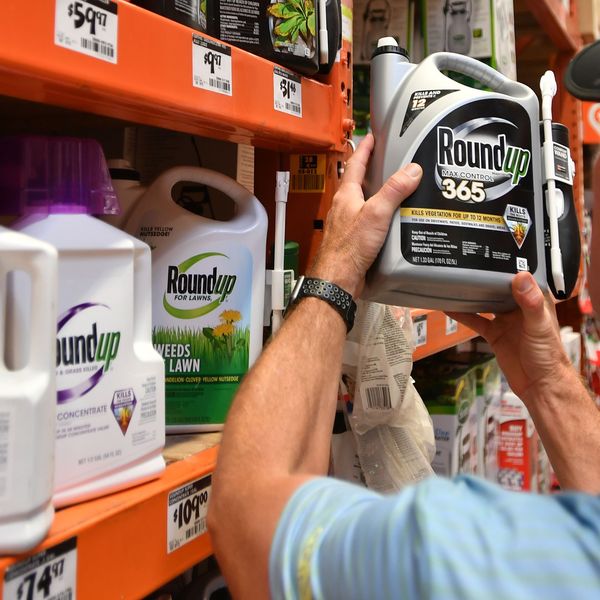
A crop duster sprays pesticides on fields near Pullman in Whitman County, Washington. (Photo: Wolfgang Kaehler/Avalon/Universal Images Group via Getty Images)
Over 400 Groups Call on UN Food Agency to 'End Partnership With Pesticide Industry'
"We cannot allow the U.N. agency mandated to support farmers and agricultural systems aligning with the industry that aims to influence national policy and causes such egregious pesticide poisoning and environmental devastation."
More than 400 advocacy groups on Thursday urged the United Nations Food and Agriculture Organization to cancel its partnership with an industry lobby group representing the world's largest manufacturers of toxic pesticides.
"Use of hazardous pesticides is inconsistent with the rights protected by the United Nations."
As the Food and Agriculture Organization (FAO) Council prepares to convene next week, the Pesticide Action Network (PAN) published a letter asserting that the U.N. agency's agreement with CropLife International--whose members include multinational pesticide giants BASF, Bayer, Corteva, FMC, and Syngtenta--"is incompatible with FAO's obligations to uphold human rights."
The letter's signers--who include 10 other global networks acting on behalf of 430 civil society, Indigenous, and other advocacy groups from 69 countries--assert that "use of hazardous pesticides is inconsistent with the rights protected by the United Nations."
These include the rights to "health; clean, healthy, and sustainable environment; safe working conditions; adequate food; safe and clean water and sanitation; a dignified life; and rights of Indigenous peoples, women, children, workers, peasants, and other people working in rural areas."
\u201c\ud83d\udce2\u203c\ufe0f\ud83c\udf0f430 civil society and Indigenous peoples groups from 69 countries told the @FAO Council to end its partnership w/ @CropLifeIntl. Member States must heed these calls to address concerns over human rights & pesticide industry influence in the UN! Stop the #ToxicAlliance!\ud83d\udc47\u201d— Simone Adler (@Simone Adler) 1654791904
In a briefing to FAO member states, groups that signed the letter note that CropLife companies make 35% of their sales from highly hazardous pesticides (HHPs), which "pose the highest levels of risk to health and the environment and are behind some of the most egregious poisoning cases and environmental destruction."
According to the paper, 385 million farm workers--44% of the global total--are poisoned around the world annually by HHPs.
"These pesticide and GM seed manufacturers exert enormous pressure on governments that enact policies to protect against pesticide harms, and they particularly target the export of their products to countries in the Global South," Simone Adler, the organizing co-director and campaign co-coordinator at Pesticide Action Network North America (PANNA), said in a statement.
"We cannot allow the U.N. agency mandated to support farmers and agricultural systems aligning with the industry that aims to influence national policy and causes such egregious pesticide poisoning and environmental devastation," they added.
The letter's signatories urge FAO to promote agroecology, an "approach that offers viable and sustainable proposals for generating ecologically based food and farming systems without the use of toxic pesticides."
An Urgent Message From Our Co-Founder
Dear Common Dreams reader, The U.S. is on a fast track to authoritarianism like nothing I've ever seen. Meanwhile, corporate news outlets are utterly capitulating to Trump, twisting their coverage to avoid drawing his ire while lining up to stuff cash in his pockets. That's why I believe that Common Dreams is doing the best and most consequential reporting that we've ever done. Our small but mighty team is a progressive reporting powerhouse, covering the news every day that the corporate media never will. Our mission has always been simple: To inform. To inspire. And to ignite change for the common good. Now here's the key piece that I want all our readers to understand: None of this would be possible without your financial support. That's not just some fundraising cliche. It's the absolute and literal truth. We don't accept corporate advertising and never will. We don't have a paywall because we don't think people should be blocked from critical news based on their ability to pay. Everything we do is funded by the donations of readers like you. Will you donate now to help power the nonprofit, independent reporting of Common Dreams? Thank you for being a vital member of our community. Together, we can keep independent journalism alive when it’s needed most. - Craig Brown, Co-founder |
More than 400 advocacy groups on Thursday urged the United Nations Food and Agriculture Organization to cancel its partnership with an industry lobby group representing the world's largest manufacturers of toxic pesticides.
"Use of hazardous pesticides is inconsistent with the rights protected by the United Nations."
As the Food and Agriculture Organization (FAO) Council prepares to convene next week, the Pesticide Action Network (PAN) published a letter asserting that the U.N. agency's agreement with CropLife International--whose members include multinational pesticide giants BASF, Bayer, Corteva, FMC, and Syngtenta--"is incompatible with FAO's obligations to uphold human rights."
The letter's signers--who include 10 other global networks acting on behalf of 430 civil society, Indigenous, and other advocacy groups from 69 countries--assert that "use of hazardous pesticides is inconsistent with the rights protected by the United Nations."
These include the rights to "health; clean, healthy, and sustainable environment; safe working conditions; adequate food; safe and clean water and sanitation; a dignified life; and rights of Indigenous peoples, women, children, workers, peasants, and other people working in rural areas."
\u201c\ud83d\udce2\u203c\ufe0f\ud83c\udf0f430 civil society and Indigenous peoples groups from 69 countries told the @FAO Council to end its partnership w/ @CropLifeIntl. Member States must heed these calls to address concerns over human rights & pesticide industry influence in the UN! Stop the #ToxicAlliance!\ud83d\udc47\u201d— Simone Adler (@Simone Adler) 1654791904
In a briefing to FAO member states, groups that signed the letter note that CropLife companies make 35% of their sales from highly hazardous pesticides (HHPs), which "pose the highest levels of risk to health and the environment and are behind some of the most egregious poisoning cases and environmental destruction."
According to the paper, 385 million farm workers--44% of the global total--are poisoned around the world annually by HHPs.
"These pesticide and GM seed manufacturers exert enormous pressure on governments that enact policies to protect against pesticide harms, and they particularly target the export of their products to countries in the Global South," Simone Adler, the organizing co-director and campaign co-coordinator at Pesticide Action Network North America (PANNA), said in a statement.
"We cannot allow the U.N. agency mandated to support farmers and agricultural systems aligning with the industry that aims to influence national policy and causes such egregious pesticide poisoning and environmental devastation," they added.
The letter's signatories urge FAO to promote agroecology, an "approach that offers viable and sustainable proposals for generating ecologically based food and farming systems without the use of toxic pesticides."
More than 400 advocacy groups on Thursday urged the United Nations Food and Agriculture Organization to cancel its partnership with an industry lobby group representing the world's largest manufacturers of toxic pesticides.
"Use of hazardous pesticides is inconsistent with the rights protected by the United Nations."
As the Food and Agriculture Organization (FAO) Council prepares to convene next week, the Pesticide Action Network (PAN) published a letter asserting that the U.N. agency's agreement with CropLife International--whose members include multinational pesticide giants BASF, Bayer, Corteva, FMC, and Syngtenta--"is incompatible with FAO's obligations to uphold human rights."
The letter's signers--who include 10 other global networks acting on behalf of 430 civil society, Indigenous, and other advocacy groups from 69 countries--assert that "use of hazardous pesticides is inconsistent with the rights protected by the United Nations."
These include the rights to "health; clean, healthy, and sustainable environment; safe working conditions; adequate food; safe and clean water and sanitation; a dignified life; and rights of Indigenous peoples, women, children, workers, peasants, and other people working in rural areas."
\u201c\ud83d\udce2\u203c\ufe0f\ud83c\udf0f430 civil society and Indigenous peoples groups from 69 countries told the @FAO Council to end its partnership w/ @CropLifeIntl. Member States must heed these calls to address concerns over human rights & pesticide industry influence in the UN! Stop the #ToxicAlliance!\ud83d\udc47\u201d— Simone Adler (@Simone Adler) 1654791904
In a briefing to FAO member states, groups that signed the letter note that CropLife companies make 35% of their sales from highly hazardous pesticides (HHPs), which "pose the highest levels of risk to health and the environment and are behind some of the most egregious poisoning cases and environmental destruction."
According to the paper, 385 million farm workers--44% of the global total--are poisoned around the world annually by HHPs.
"These pesticide and GM seed manufacturers exert enormous pressure on governments that enact policies to protect against pesticide harms, and they particularly target the export of their products to countries in the Global South," Simone Adler, the organizing co-director and campaign co-coordinator at Pesticide Action Network North America (PANNA), said in a statement.
"We cannot allow the U.N. agency mandated to support farmers and agricultural systems aligning with the industry that aims to influence national policy and causes such egregious pesticide poisoning and environmental devastation," they added.
The letter's signatories urge FAO to promote agroecology, an "approach that offers viable and sustainable proposals for generating ecologically based food and farming systems without the use of toxic pesticides."

